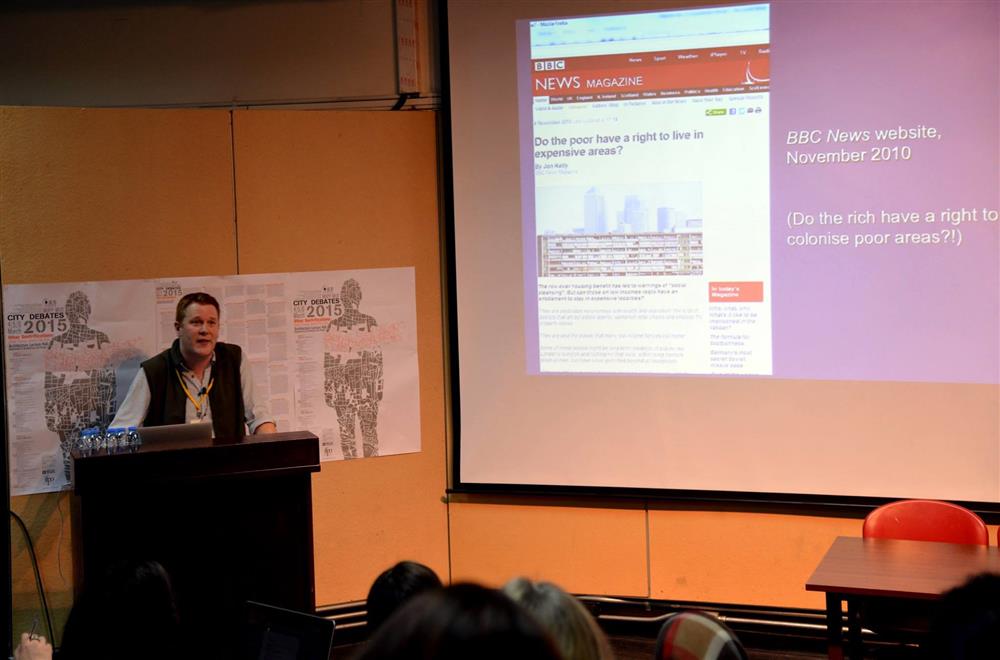

Acknowledgments
Not long ago, I wrote an acknowledgment for a collaborative project with Tom Slater and Loretta Lees, Gentrification (New York and London: Routledge, 2007). The enterprise and activity of publishing has always fascinated me, and I have been struggling for many years to learn about the transformation of the industry -- and the social, cultural, and scholarly enterprise it attempts to represent -- while trying in vain to forget such horrifying opening lines as this: "It is customary for those who decide to add another volume to the world's overloaded bookshelves to offer a justification, if not an apology, for their presumption." (Reginald Golledge, Helen Couclelis, and Peter Gould, eds. [1988], A Ground For Common Search. Santa Barbara, CA: Santa Barbara Geographical Press, p. 1.) The proliferation of online scholarship has only attenuated the rate of acceleration of accumulation of mass on the world's bookshelves, and even online, apologies are in order for the assault on the individual and collective human attention span. And so I wrote acknowledgments that somehow got me off the hook by blaming others -- while emphasizing that if there is anything useful whatsoever in the various things I do, I will stubbornly refuse to take credit for any of it.
Blood and Acknowledgments
The sentiment applies to everything I do, and it really does feel as if it runs in my blood (in part because my parents gave me a lasting spirit of deep, modest reverence). Indeed, I see the collective connections almost everywhere I turn, as in the case when I walked by the scene shown above in August, 2004, and immediately thought of one of the debts I've accumulated, from what I learned from a text that shaped me years ago -- the "Statistics Don't Bleed" chapter on geography's quantitative revolution, in David Livingstone's (1992) The Geographical Tradition (Oxford: Blackwell). For years I've fought both with and against what I learned from that chapter, and my acknowledgment to Livingstone on this particular day was shaped by the fact that George W. Bush was in town on his re-election campaign. While Bush brought the cheering Republican faithful to their feet, the everyday landscapes of Albuquerque taught me once again that the daily, mundane terrorism of poverty and inequality that we can see anywhere we care to look are never that far removed from the ideological factories of Washington that manufacture consent, Chomsky-style, in the global commodity chains of what Harvey aptly describes as accumulation by dispossession. Folks surrounded by extraordinary wealth who have to go down the street to sell their plasma for cash do have something in common with hooded prisoners declared enemy combatants, with no review and in many cases on questionable evidence, and subjected to "robust" interrogation methods that yield pain that's pretty bad, but not "equivalent in intensity" to the pain of "organ failure," in the words of Jay S. Bybee's infamous 2002 legal opinion redefining torture. In other words, statistics do bleed, and my acknowledgment for learning the full implications of this fact, this thing done, must give all appropriate credit to Livingstone as well as, I am forced to confess while enduring what feels like intellectual water-boarding, Bybee and Bush.
So that's a terribly verbose explanation of why I it seemed appropriate to put an acknowledgments section here. My apologies for the torture and the outrages on personal dignity that I have committed against you. Here are the acknowledgments I penned for the book with Tom and Loretta.
Flowers
"I have gathered a posie of other men's flowers, and only the thread that binds them is my own."
-Montaigne
I first encountered these words more than twenty years ago when I read the acknowledgments in Peter Gould's The Geographer at Work. Peter had first seen those lines four decades earlier in the title page of an anthology of poems committed to memory during the Second World War by Field Marshal A.P. Wavell (Other Men's Flowers, Putnam, New York, 1945). The words come back to me every single time I sign my name as an author. As I gather the posie of flowers from the women and men who have taught me so much, I realize that Montaigne and Gould taught me how to be a socialist scholar -- a scholar who understands that knowledge is like language, community, urbanization, and real-estate value: it "is socially created and not something that belongs to any individual" (see page 272 in this book). The value of my contribution to this project, then, comes from what I've learned from others. I'm deeply indebted for what I've learned from Tom and Loretta, brilliant and passionate co-authors. And I am also grateful to Dan Hammel, who first inspired a passion for mapping the frontiers of wealth and poverty as we walked through countless streets and alleys in Minneapolis, St. Paul, Philadelphia, Boston, Baltimore, Chicago, Detroit, and so many other cities. I've taken out scores of exotic low-downpayment, negative-amortization mortgages in an attempt to repay what I've learned about the unfinished research and resistance agenda on gentrification from Neil Smith, Kathe Newman, Jason Hackworth, and James DeFilippis -- friends and colleagues with whom I have been privileged to collaborate. I am also indebted for all that I've learned from Mona Atia, Bob Beauregard, Keith Brown, Holly Foxcroft, Dennis Gale, George Galster, Ed Goetz, Bria Holcomb, Steve Holloway, David Imbroscio, Larry Keating, Bob Lake, Mickey Lauria, Liz Lee, David Ley, Peter Marcuse, Pat McCoy, Pablo Mendez, Chris Neidt, Jamie Peck, Kris Rengert, Matthew Rofe, Heather Smith, and Daphne Spain. And I've accumulated sizeable debts in what I have learned from those who might take issue with what I've written on the subject: John S. Adams, Brian J.L. Berry, Lance Freeman, John D. Kasarda, David Listokin, David Varady, and Vernon R. Wyly. Finally, parts of this book have benefited from extremely valuable critical comments and editorial advice from Tyler Pearce.
This web page has been tested and found not to cause mental harm from any of the predicate acts specified in 18 U.S.C. §§ 2340-2340A, "namely: threats of imminent death; threats of the infliction of the kind of pain that would amount to physical torture; infliction of such physical pain as a means of psychological torture; use of drugs or other procedures designed to deeply disrupt the senses, or fundamentally alter an individual's personality; or threatening to do any of these things to a third party." Jay S. Bybee (2002). "Memorandum for Alberto R. Gonzales, Counsel to the President, August 1. Washington, DC: U.S. Department of Justice, Office of Legal Counsel, p. 1.
Albuquerque, NM, August 2004 (Elvin Wyly)
"In a hierarchy every employee tends to rise to his level of incompetence." "Many, to be sure, may win a promotion or two, moving from one level of competence to a higher level of competence. But competence in that new position qualifies them for still another promotion. For each individual, for you, for me, the final promotion is from a level of competence to a level of incompetence." And thus "In time, every post tends to be occupied by an employee who is incompetent to carry out its duties." "You will rarely find, of course, a system in which every employee has reached his level of incompetence. In most instances, something is being done to further the ostensible purposes for which the hierarchy exists. Work is accomplished by those employees who have not yet reached their level of incompetence."
But resistance is possible. Beware percussive sublimation, hierarchal exfoliation, rigor cartis, and the Final Placement Syndrome. Practice creative incompetence, and you may have a chance of achieving happiness at Zero PQ (Promotion Quotient=0): "You can apply the power of negative thinking. Ask yourself, 'How would I like to work for my boss's boss?'" Laurence J. Peter and Raymond Hull (1969). The Peter Principle. New York: William Morrow & Company, quotes from p. 25, 26, 161.
"The history of human knowledge clearly proves that all our labors in the sciences and arts are so connected, whether in the same or in succeeding generations, that the discoveries of one age prepare those of the following, as the former had been themselves prepared by those of the preceding. It has been demonstrated that the isolated power of genius is greatly less than that with which it has been credited. The man most justly distinguished by great discoveries almost always owes the largest share of his success to his predecessors in the same career." August Comte (1822), "Plan of the Scientific Operations Necessary for Reorganizing Society." In Gertrud Lenzer, ed., August Comte and Positivism: The Essential Writings. New Brunswick, NJ: Transaction Publishers, 1998, 9-67, quote from p. 41.
CopyLeft 2002-2015 Elvin K. Wyly
Except where otherwise noted, this site is

Brainstorming some of the mentors who inspired The New Meaning of Housing in America
"Intellectual wealth is achieved through the accumulation of debts."
Neil Smith (1984). Uneven Development: Nature, Capital, and the Production of Space; p. xvi, 2008 Third Edition. Athens, GA: University of Georgia Press.

Tom Slater
a powerful, eloquent voice for the right to the city, speaking in Beirut, March 2015


